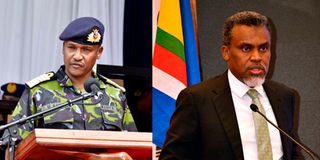
National Intelligence Service director-general Noordin Haji.
The Director-General of the National Intelligence Service Noordin Haji on Thursday delivered an unprecedented public lecture as part of an initiative to lift the veil of secrecy around the spy agency’s work.
However, security chiefs came out distinctly uncomfortable with media reporting that focused on remarks by Kenya Defence Forces Chief of General Staff Charles Kahariri that were seen as threats to political dissenters continuing to chant ‘Ruto Must Go’ slogans.
In remarks after Haji had delivered his formal lecture, Gen Kahariri dispensed with his written speech to deliver off-the-cuff remarks on a wide range of issues around the role of the military in national security and responses to emerging threats.
What captured the headlines was an aside suggesting that the military could intervene to defend President William Ruto against political dissent. While affirming the apolitical role of the Kenya Defence Forces, the General acknowledged recent political dynamics dating back to the anti-government Gen Z uprising of June last year: “When some people say they are tired with this government, a government they elected on their own, and say ‘Must Go’, that ‘Must Go’, must be done according to the Constitution”.
He did not have to mention the president’s name as it was immediately tacit that he was referring to the subject of ‘Ruto Must Go’ chants, which have become common in many public spaces.
In fact President Ruto has even earned the ‘Must Go’ moniker alongside other unflattering nicknames cush as as Zakayo and Kasongo.
Kahariri’s statement might have seemed fairly reasonable. There are indeed constitutional avenues for those unhappy with a president to remove him when elections come around. A president can also be impeached through established legal mechanisms.
The military chief issued no explicit threat to crack down on anti-government demonstrations, but it was not surprising that most of the media picked on his words as a warning against “Ruto Must Go” chants, which by themselves are strictly not illegal or threats to national security.
Internal threats
He pointed out that the military has a mandate to defend the constitutional order and to defend the country against both external and internal threats, defending the contentious deployment on Nairobi streets during the Gen Z protests, but seemed not to make a distinction between challenges to Ruto’s rule, and challenges to national security and sovereignty.

Chief of Defence Forces General Charles Kahariri and Director-General of the National Intelligence Service (NIS) Noordin Haji.
The military has also been in active deployment, where the National Police Service has been overwhelmed by terrorist activity in a large swathe of the north-eastern region bordering Somalia and contiguous areas in the coast and eastern regions, or banditry and cattle rustling in the northern Rift Valley. There has been little or no disquiet over such deployments, but what Gen Kaharari raised is the spectre of the military being used to crush political dissent.
As soon as the first reports appeared from the historic engagement, an inaugural public lecture by Haji at the National Intelligence and Research University, some in the security sector let it be known that they were uncomfortable with what they termed ‘sensationalism’.
There was also online chatter and discussion on various platforms where some levelled similar accusations against the media.
A source close to the agency expressed fear that such reports could undermine the Director’s efforts to demystify the spy outfit's operations and cultivate more open relations with the public in an environment where strict secrecy is the norm.
Indeed, it was ironic that as Haji was delivering a public address with media, civil society, human rights activist lawyers and other professionals, university student leaders, Gen Z activists, academia, boda boda operators and various other invited groups present in deliberate demonstration of a new regime of openness, transparency and accountability, the Intelligence Service inexplicably found it necessary to jam mobile phone networks in the vicinity.
In the wake of indirect feedback indicating that security chiefs were unhappy with media reporting, The Weekly Review reached out to Haji seeking to hear directly from him. A go-between pledged to set up an appointment but had not done so by the time of going to press.
Security command structure
We also reached out to the military seeking to get Gen Kaharari’s position. In response, military spokesman Brig Paul Njoroge forwarded a video clip of the KDF commander addressing the National Intelligence and Research University convocation, but did not respond to a direct question on whether the General had any issues with the media reporting.
The Weekly Review, however, established independently through various sources that the matter was being discussed at the highest levels of the security command structure.
The issue served in many ways to take away the gloss from an event that could herald the most far-reaching reforms of the security intelligence structure since the transition from the Kenya Police Special Branch to the present and independent, and professional service. The reforms—largely driven by Brig Wilson Boinnet, who also oversaw the transition from President Daniel arap Moi’s one-party regime to the democratic multi-party system more than 30 years ago—saw the service evolve from the Kenya Police unit notorious for torture and political assassinations, to a modern civilian agency more focused on intelligence gathering, analysis and research rather arrest, renditions confinement and termination of security threats.
Haji in his address painted with broad brushstrokes further evolution from the colonial era and single-party regime tool of oppression, to the modern civilian outfit moving from pre-occupation with regime survival, to refocusing on the emergent threat to national security.
Haji highlighted trends such as Artificial Intelligence, cyber-security, disinformation and misinformation and emerging threats to national security.
But his real focus was on what he called the bold shift in the National Intelligence Service from a closed culture to one of transparency and public engagement.
“Today is a reflection of that shift, he said, unveiling a new paradigm where Intelligence work will no longer be conducted in the shadows as security is the responsibility of all citizens rather than just the mandated agencies.
The key challenge was to build trust in the security intelligence networks, but there was also the challenge of ingrained mindsets and resistance from within.
Another way to determine the fine line between the need for secrecy and the right to know.
He pointed out that Boinnett reforms which were further entrenched by the 2010 Constitution and the 2014 security laws amendments, the Intelligence community was preoccupied with regime survival, but the rapidly evolving global landscape demanded a seismic attitude shift.
Gen Kaharari in his address largely agreed with Haji’s prognosis, highlighting regional conflicts and their impact on Kenyan security and economic interests. He also dwelt quite at length on Kenya’s tradition of an apolitical military which has also resisted the ethnic competition evident in the country’s politics.
However, an otherwise sober and well-reasoned presentation from a military commander who comes across more as a thoughtful academic than a gung-ho soldier was probably undermined by one comment which was open to one obvious interpretation: Readiness of the military to crush political dissent. That could well reflect a moment of naivety in communications and messaging.
Incidentally, the comments by the Defence Forces Chief came just two weeks after opposition leader Raila Odinga, in an exclusive interview with The Weekly Review, claimed that his teaming up with the President Ruto to counter the Gen Z revolt helped to avert a military takeover.
What Raila had alleged was that Kenya was in danger of Ruto handing over power to the military, rather than the military moving to seize power.
GenZ protests
The Cabinet Secretary for Defence, Soipan Tuya, denied that there was any such risk, but it was the media she took to task rather than the actual author of those comments.
The military itself did not respond. It had been deployed on the streets of Nairobi in the immediate aftermath of young protestors breaching the Houses of Parliament, but other than a show of force, there is no record of the KDF firing any shots or confronting protestors.
The legal notice authorising military deployment at that time is still in place, although the GenZ protests have long since been muted.
Law Society of Kenya President Faith Odhiambo also delivered an address which focused largely on police excesses, human rights abuses, extra-judicial killings and the refusal of the Independent Policing Oversight Authority to act.
The presentations were followed by a panel discussion featuring former Foreign Minister Amina Mohammed, and Canadian Horn of Africa security expert Mathew Bryden. International Commission of Jurists deputy executive director and Media Complaints Commission chair, Demas Kiprono and United States International University-Africa Vice Chancellor, Mwenda Ntrarangwi.
That was followed by a plenary open to the floor. This writer got the opportunity to point out the contradiction in Haji promising a shift to focus on real national security rather than regime survival, and yet the NIS remains part of a multi-agency operation, together with the Directorate of Criminal Investigations and a unit of the military, responsible for a wave of abductions, enforced disappearances, torture, illegal confinements and extra-judicial executions since the outbreak of the Gen Z revolt last June.
The writer cited himself as an example of a person who was violently abducted by State agents last July while seeking refuge in a police station but mercifully freed shortly afterwards when a video of the drama went on social media.
In response, Haji said that he couldn’t comment as most of the cases were in the courts, which is not true as most remain unresolved for lack of action by the authorities. He also attributed some of the reports to misinformation, though it was unclear whether that was in reference to the abductions or to the role of NIS.












